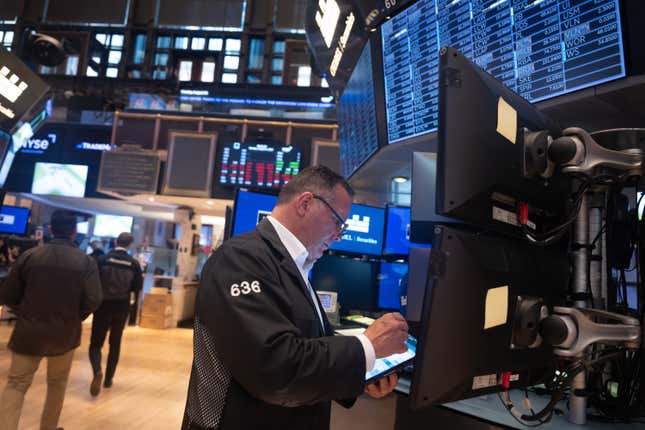
In This Story
The global stock market declined sharply on Monday over concerns about the health of the U.S. economy. But amid the chaos, analysts are calling for calm.
Wall Street’s “fear index” (the VIX) soared as investors’ anxieties came to life, starting with a 12% plunge for Japan’s Nikkei 225. Major U.S. indices subsequently declined — including a 900 point drop from the Dow; tech stocks, including Nvidia and Apple, dropped; the price of Bitcoin plummeted; and even electric vehicle stocks suffered.
While the sell-off was an unwelcome incident, analysts at Wedbush urged investors to remain level-headed, especially when it comes to tech stocks.
“Does a scary Yen carry trade unwind triggering market chaos globally this morning change our bullish tech AI thesis ... no. It’s scary, but we navigate through the turbulence,” Wedbush analysts led by Dan Ives wrote in a research note Monday.
The downturn was spurred by Friday’s weaker-than-expected U.S. jobs report, that saw unemployment tick up to 4.3% — it’s highest level in three years. Meanwhile, employers added just 114,000 jobs in July, falling far short of the 175,000 gain economists polled by FactSet had projected.
Across the Pacific, the Bank of Japan raised its benchmark interest rate, causing the value of the yen to rise, sparking fears of “carry trades.” This is a trading strategy that involves borrowing with a currency at a low interest rate, like the yen, and using it to buy higher-returning investments.
But the Wedbush researchers reiterated their belief in a soft landing case, where the central bank brings inflation to its 2% target without tipping the economy to a recession. They also pointed to several pieces of positive news, including the Federal Reserve likely embarking on a major interest rate cutting cycle over the next year and a half, and optimism around artificial intelligence. And in another glass-half-full call, the analysts acknowledged the new opportunities Monday’s sell-off could create for investors.
“We do not hide in times of panic and market chaos and ultimately over the years these massive sell-offs have created the best long term opportunities to own the likes of Microsoft, Apple, Nvidia, Salesforce, Oracle, Palo Alto, Tesla, Alphabet, Amazon and other tech winners,” Wedbush analysts wrote. “In a nutshell....This is not the time to panic on the tech trade, its the time to go bargain hunting for our top tech names after this panic sell-off.”
Laurent Birade, banking industry practice lead at Moody’s, struck a more cautious note when it came to the banking industry, including warnings of potential liquidity risks for banks.
Birade noted that the spike in the VIX and the drop in Treasury yield are a sign of a flight to safer assets amid fears of an economic slowdown. This could pose “significant challenges” for banks, especially when it comes to funding and liquidity, he said.
“The sudden weakening of the dollar and the surge in market volatility underscore the fragility of the current economic environment,” Birade said. “For banks, potential liquidity dislocation could amplify market instability, affecting both funding and lending operations.”
“Banks should prepare for heightened uncertainty and ensure they have robust safeguards in place to weather potential economic headwinds,” he added.